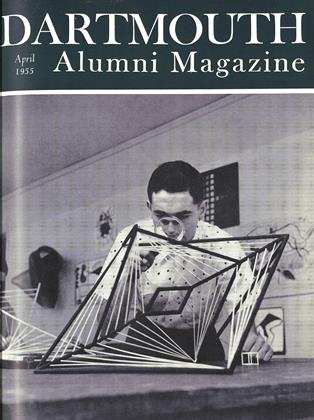By JamesM. O'Neill '07. New York: McMullen Books,1954. 227 PP- $3.00.
Does the Roman Catholic Church differ in important respects from our American tradition with regard to religious liberty and does it entertain an ideal of Church-State relations which is alien to America? That these are controversial questions is not denied by Dr. O'Neill.
In this work, Dr. O'Neill argues that controversy is inevitable and necessary to democracy. As a Roman Catholic layman, he is willing and eager to enter the controversy over these topics. One does not, however, have to read many pages before becoming aware that the book is not only intended as a contribution to this controversy; it also is an instrument by which Dr. O'Neill expresses his deep concern that these issues are being approached today by many people in an uncontroversial way. For controversy implies reference to facts and a courteous temper; controversy is determined by the fact that truth is its end. Dr. O'Neill feels that there are a number of voices today speaking on these issues in an unfactual and, indeed, insulting way. In short, there is an attack upon Roman Catholicism which is based either upon ignorance or upon a will to deceive.
Authors such as Blanshard, Nichols, Pfeffer do not, Dr. O'Neill argues, raise the issues in a way which tends toward illumination and informed judgment. They raise the fear of a "Catholic conspiracy." They charge that there is a "Catholic line" in politics, dictated from Rome. They spread the notion that American Roman Catholics are opposed to the American tradition of separation of Church and State and are merely waiting until they have a sufficient majority of the population to suppress the liberties of others. The heart of Dr. O'Neill's book is the documentation of the fact that this attack exists, and a documentation of the fact that it represents a distortion of the Roman Catholic position. In particular, he contrasts the allegations with the facts upon the Roman Catholic attitude toward separation of Church and State, religious education, and censorship. He states convincingly the American Catholic record of support of the American tradition.
 View Full Issue
View Full Issue
More From This Issue
-
 Feature
FeatureAn Experiment in Dormitory Living
April 1955 By JOSEPH FRANKLIN MARSH '47, -
 Feature
FeatureThe 1955 Hanover Holiday Program
April 1955 By HERBERT W. HILL -
 Feature
FeatureThey're Putting the D in Debating
April 1955 By FRANK PEMBERTON -
 Feature
FeatureTurkeys for Dartmouth
April 1955 -
 Class Notes
Class Notes1918
April 1955 By ERNEST H. EARLEY, RICHARD A. HOLTON -
 Article
ArticleThe Undergraduate Chair
April 1955 By G. H. CASSELS-SMITH '55
FRED BERTHOLD '45
Books
-
 Books
BooksFaculty Notes
February 1947 -
 Books
BooksTottering Icons
October 1978 By PARTON KEESE '50 -
 Books
BooksCONCERNING JUVENILE DELINQUENCY
January 1943 By R. P. Holben -
 Books
BooksCOLLEGE ORGANIZATION AND ADMINISTRATION,
January 1948 By Roy J. Deferrari, HOWARD F. DUNHAM '11 -
 Books
BooksMETHOD AND THEORY IN EXPERIMENTAL PSYCHOLOGY.
January 1954 By THEODORE KARWOSKI -
 Books
BooksMorning Sunsets
APRIL 1932 By Wallace Rusterholtz




